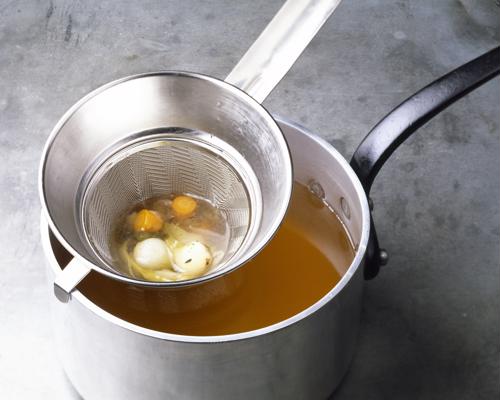In recent years, advocates of bone broth have touted it as a mineral-rich, nutritional stock that can deliver a number of health benefits. Through the process of simmering bones for hours and adding vinegar, you're left with a liquid rich in collagen, which has been shown to boost the immune system, boost gut health, reduce inflammation and boost the strength of nails, skin and hair, The Washington Post reported.
What is ironic is that, like many "novel trends," bone broth actually dates back centuries. As The Washington Post detailed, the boiling of bones has taken place since the very early ages when humans first started cooking with fire. Detailed reports of using bone broth medicinally date back to the 1500s and in the Middle Ages, it was known as "restaurer" throughout Europe, cultural historian and author of "The American Plate" Libby O'Connell explained to the source.
However, studies have found that bone broth may actually contain toxic contaminants, among other things. Before you plan to hop on the bone broth train, make sure you have all of the facts:
The Bone Broth Fad
First and foremost, it's important to note that bone broth is not compatible with a plant-based diet. Derived from animal bones, the broth still contains traces of animal product after being boiled down. As the Alternative Daily explained, while many people promote bone stock or broth as a nourishing and healing superfood, it has shown to be problematic for others. Some have found the drinkable broth to be effective in weight loss efforts, as it is low in calories and high in nutrition. Others have found relief from joint pain and have reported a noticeable difference in ageing skin. Animal bone broth has also been known to work as a liver cleanser.
Similar to trends like coconut water, turmeric and all things kale, bone broth has picked up notoriety in recent years. And with the aforementioned benefits, it's no wonder many people want to get on board. Ridding your face of wrinkles by consuming bone broth: Who wouldn't want to try it?
As is generally the case, celebrities, athletes and well-known health and lifestyle bloggers rave about the said fad's benefits and as a result, millions of consumers jump on board without first consulting with a medical expert. Not all health trends are bad and natural herbal remedies such as turmeric have great evidence-backed results. What is perhaps different about bone broth, however, is its potential danger for containing excess lead levels.

Lead Toxicity Risk
Despite a number of regulations, lead intake from marketed products still occurs at alarmingly high rates around the country. Did you know that heavy metals are purposefully added to a number of Ayurvedic supplements in the U.S.? Citing data from multiple studies, Dr. Michael Greger, explained how the medics pushing these supplements state that the lead has been detoxified by urine from cows and is therefore deemed OK for consumption.
Calcium supplements in particular have been long known to have lead contamination, especially those made from bones. Dairy and meat are on the list of products known to contain lead as well, which is what led researchers to believe the bones of animals were also filled with lead. The big concern is that lead is a neurotoxin, Greger explained. This can have a negative impact on everything from reproduction and digestion to the kidneys and bone marrow.
"There is no safe level of lead for children."
To confirm that bone broth did contain lead, researchers from the Breakspear Medical Group in the UK tested three kinds of organic chicken stock. The results, published in the U.S. National Library of Medicine National Institutes of Health, showed that there were indeed high concentrations of heavy metal lead in the chicken-bone broth. Even in the instance when the stock was made from boiling the skin and cartilage of a chicken - and not the bones - after it had already been cooked, there were very high levels of lead found. As a result, the study authors urged nutritionists and doctors to take the lead content into account when advising bone broth intake.
Lead Safety
Many proponents of these supplements and bone broth products rely on the notion that low levels of lead are not harmful to the body. The U.S. Centers for Disease Control and Prevention concludes that water containing lead, for example, is deemed safe for consumption if it meets the Environmental Protection Agency's action level for lead of 15 parts per billion. The source confirms that research has demonstrated this level of lead in water would not be enough to raise blood levels in adults. However, it should be noted that all individuals are different and body size does play a role.
However, the American Academy of Pediatrics has deemed that no level of lead is safe for children and consumption of the heavy metal can have a sometimes lasting impact on cognition and nervous system functioning.
Anyone planning to jump on the bone broth bandwagon should be sure to first do their research.






